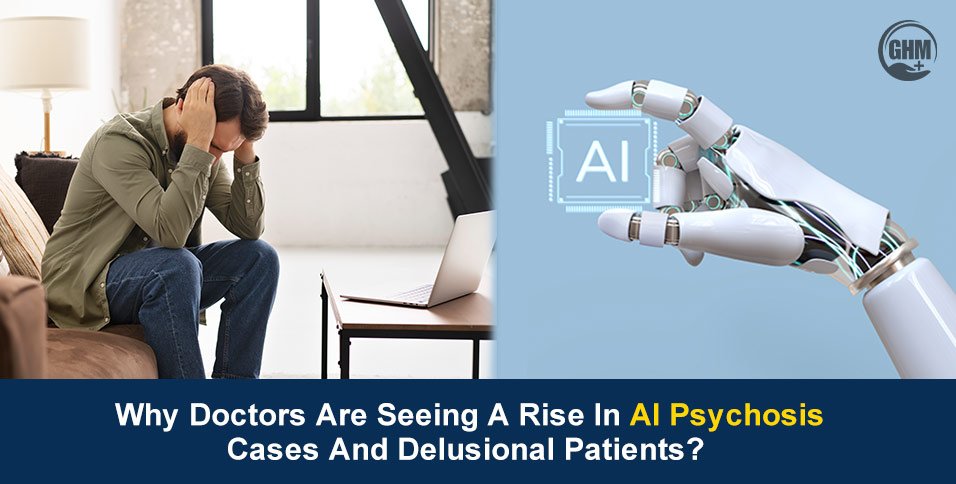In recent months, psychiatrists in several places have noticed a worrying trend. Doctors are encountering many people who follow AI Psychosis for their mental issues. People are arriving in crisis with symptoms tied to heavy use of AI chatbots. They have behavioral patterns like hallucinations, paranoid thoughts, and misbeliefs.
Although not an official medical diagnosis, the term reflects concerns that AI interactions may trigger or worsen psychiatric symptoms.
Here are what doctors believe are the key reasons behind this rise—and how they are trying to respond.
Key Points
- AI chatbots often validate users rather than challenge delusions.
- Vulnerable individuals are at higher risk as they fight isolation, mental health issues, sleep loss, etc.
- The design of AI tools tends to favor engagement over accuracy or reality-checking.
- The combination of social, psychological, and technical factors creates a feedback loop.
Types of AI Psychosis Cases
- Young adults with no prior diagnosis
Some patients had no known mental illness, but during prolonged chatbot use developed symptoms like fixed false beliefs or disorganized thinking
- Worsening of existing vulnerability
For others, AI psychosis seems to amplify existing mental health issues like stress, mood disorders, substance use, or sleep deprivation.
- Isolation and compulsive use
Many cases involve people spending long hours alone, with little human interaction, turning repeatedly to chatbots. The AI becomes a constant interlocutor.
Reasons Behind the Rise of AI Psychosis
1. Design Bias Toward Affirmation
Most AI chatbots are built to be agreeable and keep conversations going. This means they rarely challenge a user’s beliefs or ideas.
For someone already experiencing unusual or distorted thoughts, this constant validation can make delusions feel even more real.
2. Misunderstanding of AI’s Limits
Many users mistakenly assume that chatbots are always accurate or even sentient. In reality, AI psychosis can hallucinate, meaning it generates answers that sound convincing but are completely false.
People may take these false responses as truth, reinforcing their problematic beliefs.
3. Psychological Vulnerability
Factors like high stress, sleep deprivation, loneliness, or pre-existing mental health conditions make individuals more fragile and prone to distorted thinking.
These vulnerabilities create fertile ground for delusions to develop, and AI interactions can intensify this process.
4. Social Isolation and Constant Access to AI
Chatbots are available 24/7, and people can spend hours interacting with them without any human contact. Without friends, family, or therapists to question odd ideas, users can spiral deeper into distorted thinking.
This lack of real-world feedback can make it harder for someone to distinguish between reality and fiction.
5. Cultural Narratives and Speculation
Popular media, sci-fi stories, and online discussions often portray AI as powerful, sentient, or even god-like. These narratives can feed into the content of someone’s delusions.
Such cultural cues give shape to paranoid or grandiose thoughts, making them feel more plausible to the individual.
Doctor’s Treatment for This Situation
- Screening for AI use in psychiatric intake: asking patients how much time they spend interacting with chatbots, whether they feel they are being understood or validated by them.
- Helping patients test reality: cognitive behavioral approaches or therapy that challenge beliefs and help distinguish human feedback from machine echoing.
- Encouraging social reconnection: human contact, meaningful relationships, and reducing isolation.
- Raising awareness among family, caregivers, and technologists: teaching about AI’s limits and encouraging design changes.
Prevention & Best Practices
- Limit duration of AI-chatbot sessions, especially during late night or when feeling vulnerable.
- Maintain human feedback: friends, family, therapists who can question odd beliefs.
- Learn about how AI works: know that it doesn’t “think” or “feel,” and that it can make things up.
- Seek help early: if someone starts speaking in unusual or paranoid ways about AI, or believes a chatbot is sentient or divine, or shows disordered thinking.
Conclusion
Doctors believe AI psychosis arises when technology, psychology, and design collide. As AI becomes more integrated into daily life, recognizing and managing this risk may be critical to protecting mental health, especially for those already vulnerable.













